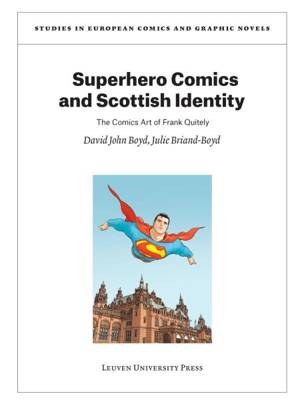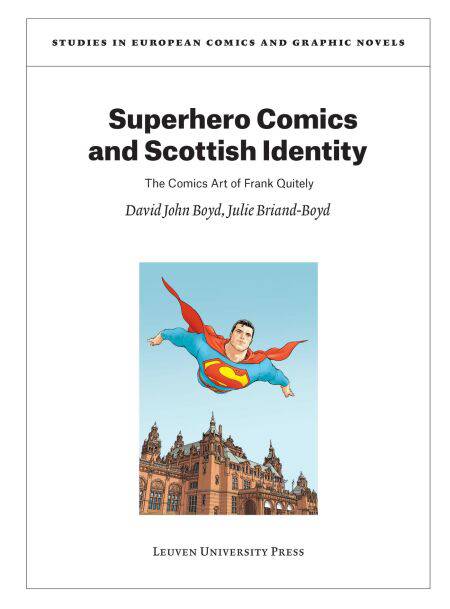
Bedankt voor het vertrouwen het afgelopen jaar! Om jou te bedanken bieden we GRATIS verzending (in België) aan op alles gedurende de hele maand januari.
- Afhalen na 1 uur in een winkel met voorraad
- In januari gratis thuislevering in België
- Ruim aanbod met 7 miljoen producten
Bedankt voor het vertrouwen het afgelopen jaar! Om jou te bedanken bieden we GRATIS verzending (in België) aan op alles gedurende de hele maand januari.
- Afhalen na 1 uur in een winkel met voorraad
- In januari gratis thuislevering in België
- Ruim aanbod met 7 miljoen producten
Zoeken
Superhero Comics and Scottish Identity E-BOOK
The Comics Art of Frank Quitely
David John Boyd, Julie Briand-Boyd
€ 51,00
+ 51 punten
Uitvoering
Omschrijving
The work of Frank Quitely and the role of comics art in contemporary Scottish culture, politics and society.
Superhero Comics and Scottish Identity explores the life and career of Glasgow-born, Eisner Award-winning, and internationally acclaimed Marvel, DC, and Image Comics artist Frank Quitely. With a prolific career spanning more than three decades, Quitely played a pivotal role in the British superhero renaissance of the 1990s and 2000s and in the explosive emergence of the Scottish new wave of comics, a movement that included peers like Alan Grant, Mark Millar, and Grant Morrison, but has been underrepresented in both comics studies and Scottish studies. This work investigates questions of historical and contemporary expressions of Scottishness in transcultural comics genres such as superhero, science fiction, and fantasy. Framed through the lens of comics and literary genres, as well as their British and American editors, Quitely's approach to Scottishness is oblique and self-reflexive; his expressions of Scottishness are tensely bound to current nuanced examinations of Scottish national, literary and historical subjectivity. His work oscillates between two axiomatic antipodes: the regional, provincial, and local versus the transnational, cosmopolitan, and global.
This comprehensive study also features an in-depth interview with Quitely, as well as unearthed archives, sketchbooks, notes, and donated or personal artworks not available elsewhere.
Superhero Comics and Scottish Identity explores the life and career of Glasgow-born, Eisner Award-winning, and internationally acclaimed Marvel, DC, and Image Comics artist Frank Quitely. With a prolific career spanning more than three decades, Quitely played a pivotal role in the British superhero renaissance of the 1990s and 2000s and in the explosive emergence of the Scottish new wave of comics, a movement that included peers like Alan Grant, Mark Millar, and Grant Morrison, but has been underrepresented in both comics studies and Scottish studies. This work investigates questions of historical and contemporary expressions of Scottishness in transcultural comics genres such as superhero, science fiction, and fantasy. Framed through the lens of comics and literary genres, as well as their British and American editors, Quitely's approach to Scottishness is oblique and self-reflexive; his expressions of Scottishness are tensely bound to current nuanced examinations of Scottish national, literary and historical subjectivity. His work oscillates between two axiomatic antipodes: the regional, provincial, and local versus the transnational, cosmopolitan, and global.
This comprehensive study also features an in-depth interview with Quitely, as well as unearthed archives, sketchbooks, notes, and donated or personal artworks not available elsewhere.
Specificaties
Betrokkenen
- Auteur(s):
- Uitgeverij:
Inhoud
- Aantal bladzijden:
- 336
- Taal:
- Engels
- Reeks:
Eigenschappen
- Productcode (EAN):
- 9789461666536
- Verschijningsdatum:
- 24/06/2025
- Uitvoering:
- E-book
- Beveiligd met:
- Digital watermarking
- Formaat:
- ePub

Alleen bij Standaard Boekhandel
+ 51 punten op je klantenkaart van Standaard Boekhandel
Beoordelingen
We publiceren alleen reviews die voldoen aan de voorwaarden voor reviews. Bekijk onze voorwaarden voor reviews.









